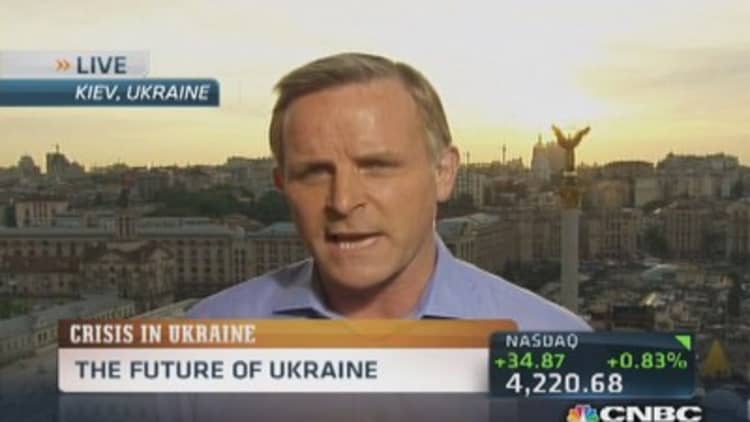Leaders of the Group of Seven industrial powers expressed growing concern over rising violence in south-eastern Ukraine and warned the Kremlin that it should move to limit the flow of arms and militants across the border or face tougher sanctions.
Meeting symbolically as the G7 without a Russian president for the first time in 17 years, the leaders did not agree specific triggers for another round of sanctions against Russia despite the urging of Barack Obama, the U.S. president, in the dinner meeting on the first night of a two-day summit.
Instead, in a communiqué the leaders left future action open-ended, saying they could "intensify targeted sanctions" or go for broader measures "should events so require".
Read MoreWhy Ukraine needs Russia-for now, anyway
But at a post-summit press conference, Angela Merkel, the German chancellor, made clear that a failure to end the destabilization inside Ukraine or to recognize the newly elected Ukrainian president, Petro Poroshenko, could lead the west to act further.
"The main thing is for Ukraine to have a sensible future," Ms Merkel said.
Read MoreG-7 meets withoutRussia in snub over Ukraine
In its communiqué, the G7 continued to push for a reversal of Russian annexation of Crimea and vowed to stand behind the new Ukrainian government even "in the face of unacceptable interference" by Russia.

"We urge the Russian Federation to recognize the results of the election, complete the withdrawal of its military on the border with Ukraine, stop the flow of weapons and militants across the border and to exercise its influence among armed separatists to lay down their weapons and renounce violence," the communiqué states.
The attempt by western leaders to symbolically isolate Russian President Vladimir Putin be excluding him from the summit appeared to be undermined by the decision by his French counterpart, François Hollande, to invite Mr Putin to ceremonies commemorating the Normandy landings on Friday.
Read More
Ben Rhodes, the White House deputy national security adviser, expressed concern over bilateral meetings that will be held with Mr Putin, and officials said Mr Obama pushed for a united front to be presented to the Russian president in all meetings in France.
"We've always said we don't want different countries to be having conversations over the head of the government in Kiev about Ukraine's future," Mr Rhodes told reporters travelling to Brussels with Mr Obama.
More from the Financial Times:
Twitter weighs online music acquisitions
Berlin paves the way for fracking
Hedgefunds bet on euro decline
Mr Hollande defended the decision to invite Mr Putin, noting that the Russian president agreed to attend even after Paris invited Mr Poroshenko. Mr Hollande added that he "would not budge" on demands for Russian de-escalation and the threat of sanctions.
"We know what we owe to the Russian people, the Soviet people of that time," Mr Hollande said. "They were heroic of their defence in the face of Nazi divisions and the suffering of the Russian people."

